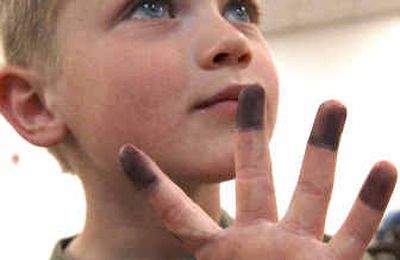Student nurses donate fingerprint kits to KEC

There’s a lot of organizations doing their best to keep North Idaho kids safe. Besides a host of local law enforcement agencies, Kootenai Electric Cooperative and the North Idaho College Student Nurses Association are doing their part as well.
As a function of its community service, the North Idaho College chapter of the Idaho Student Nurses Association recently donated 900 fingerprint and DNA kits – $2,000 worth – to Kootenai Electric Cooperative. KEC, assisted by local law enforcement agencies, operates a child identification booth at the North Idaho Fair. Fingerprinting and recording personal information can help law enforcement locate and identify a lost child.
KEC employees, assisted by representatives from the Kootenai County Sheriff’s Department, Idaho State Police and Coeur d’Alene and Post Falls police departments, weigh and measure children and record other personal information such as eye color, allergies, even friends’ names.
“We do it all electronically. We type the kids’ information in and get a printout,” said Jennifer Ross, KEC marketing representative. She added that the information is not saved. “It’s not kept in the computer. Once we clear it, it’s gone.”
The printout is given to the parents along with a fingerprint kit, if available. The kits are expensive, Ross said, and last year, they didn’t have any kits to give out.
“This will be wonderful,” she said of the student nurses’ donation. “We can give these to the kids.” In addition to fingerprint kits, there are a few DNA kits in which parents can take a strand of their kid’s hair or a swab from the inside of their cheek.
Ross said about 2,000 kids go through the booth every year. Many are repeats with parents wanting to update the information.
“It’s kind of neat. They can see their kids grow up every year,” said Sgt. Stuart Miller of Kootenai County Sheriff’s Department. Adult fingerprints don’t change but with kids, “fingerprints do change a little as they grow up,” he said.
“We’ve had infants in the booth,” said Sgt. Christie Wood of the Coeur d’Alene Police Department. “If we can get their finger in ink, we’ll do it.”
Ross added that the fingerprint and identification isn’t just for kids. It can be used for people with disabilities or those with Alzheimer’s disease.
Recording all the information centralizes it so that if something happens to a child, up-to-date information is available in one location, Miller explained. “In the heat of the moment, parents won’t remember what the child is allergic to. They barely remember what he’s wearing,” Miller said.
“God forbid, if something ever happens to a kid, (the information) can be used to identify him.”
Countywide, Miller estimates there are three calls a day reporting missing children. However, he added that in 90 percent of the time, the child is still in house – hiding or having fallen asleep under the bed or in a closet.
The fingerprint and DNA kits were purchased by the student nurses through fund-raisers.
“Part of our nursing curriculum is that we perform community service,” said Sharon Tomlinson, NIC nursing instructor and president of Idaho Nurses Association, District 11. “We try to teach nursing students that nursing isn’t just what you do for eight hours.”
“It’s important to give back to the community and let the community know we’re here for them,” said Kelly Ragland, an NIC student nurse and newly elected president of the state Idaho Student Nurses Association.